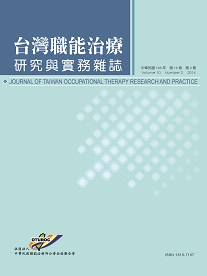Journal of Taiwan Occupational Therapy Research and Practice

半年刊,正常發行
情境式記憶測驗(Contextual Memory Test)為美國職能治療師Toglia(1993)所發展的標準化記憶評估工具,其特點在於可評估患者的記憶和後設記憶功能,以及策略使用的能力,提供後續記憶訓練的依據。雖然國外的研究已顯示此測驗在臨床上的實用性佳,但台灣治療人員在使用時應考慮其跨文化使用時的適切性;故本研究的目的旨在初步檢驗情境式記憶測驗在台灣本地的適用性。本研究含三組正常成人組和一組腦傷病患組,完整的程序和計分方式皆按照施測手冊為之。本研究的結果主要發現此評估工具對正常成人和腦傷病患具有不錯的效度,但台灣正常受試者的記憶表現會受到物品圖案之熟悉度的影響。故在台灣使用情境式記憶測驗時,需考慮文化的差異性,並謹慎解釋個案的測驗結果。
The Contextual Memory Test (CMT) developed by Toglia (1993) is a evaluation tool for assessing memory, metamemory and strategy use of clients with brain injury. Studies have supported the application of the CMT for different clinical populations. However, because the CMT was originally developed and standardized in the United States, it should be examined the appropriation when using in a cross-cultural environment. The purposes of this pilot study were: (1) to investigate the applicability of the CMT to a Taiwan population; and (2) to evaluate the items on the CMT from a cultural point of view. The CMT was administered to 64 Taiwan normal adults, grouped into 3 age categories and closely matching those in the US normative study (Toglia, 1993), and 13 patients with stroke or traumatic brain injury. The results were showed that there were significant age effects for recall and strategy use within normal subjects, and the memory impairments of patients in the CMT were classified within suspect to severe range. In addition, the performance of the CMT in Taiwan normal subjects tended to be lower than those of Americans, indicating the issue of cultural suitability should be considered. This pilot study confirmed discriminative validity of the CMT for Taiwan adult subjects. The clinical recommendations were discussed.












